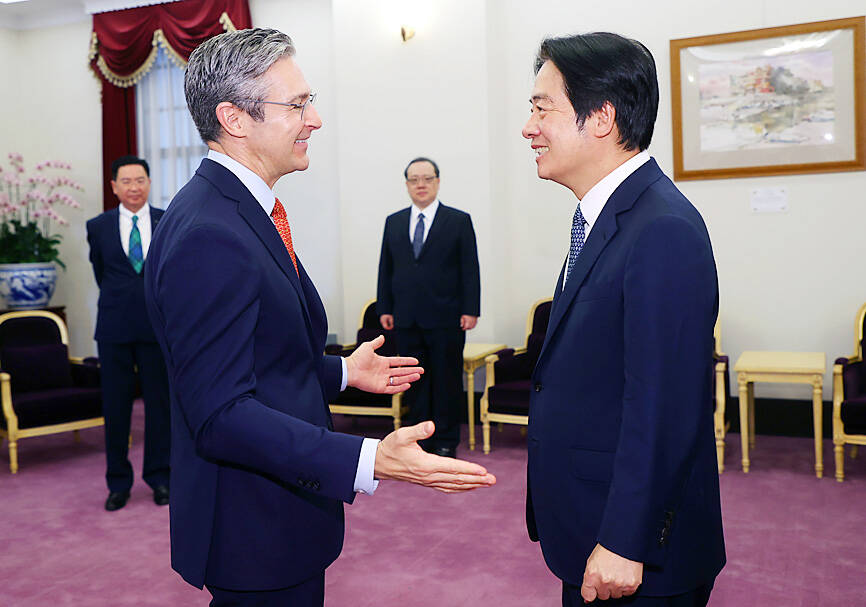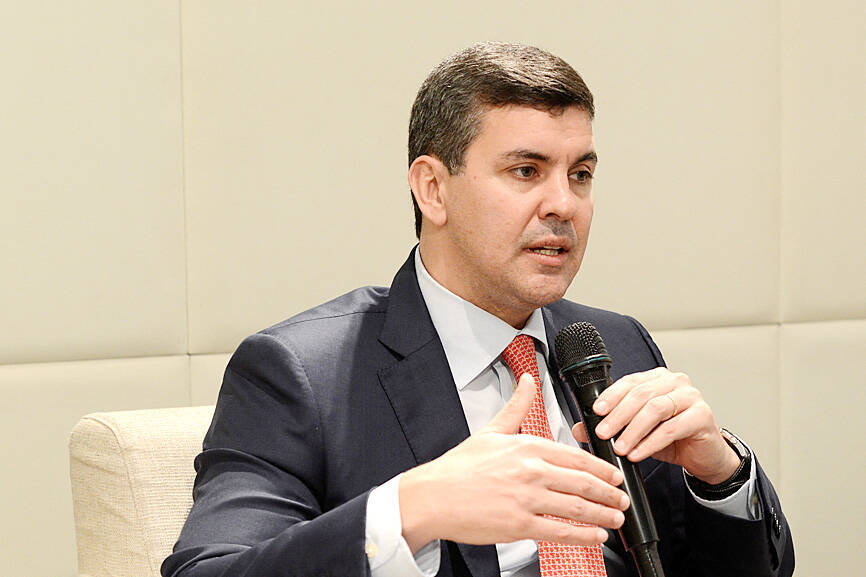President Tsai Ing-wen (蔡英文) has appointed Vice President William Lai (賴清德) to lead a delegation to attend the inauguration ceremony of Paraguayan president-elect Santiago Pena next month, Vice Minister of Foreign Affairs Alexander Yui said yesterday.
Paraguayan President Mario Abdo Benitez and Pena invited Tsai to attend the ceremony, Yui told a news conference at the Presidential Office in Taipei.
As attending the presidential inauguration of a diplomatic ally demonstrates the friendship between the two countries, Tsai appointed Lai as special envoy to deliver Taiwan’s congratulations to Pena, and has notified Abdo and Pena about the arrangement, Yui said.

Photo: CNA
Lai and the delegation are scheduled to arrive in Paraguay on Aug. 14 and attend the inauguration the next day, he said.
Lai would attend other events on behalf of Tsai, including celebrations for Asuncion’s 486th anniversary, Yui said.
Lai would meet with Abdo and Pena to exchange opinions on bilateral and international issues of common concern, he said, adding that other meetings would be arranged.

Photo: Fabian Hamacher, Reuters
Abdo visited Taiwan in February to affirm the friendship between Paraguay and Taiwan, saying that severing diplomatic relations with Taiwan would be a “historic mistake.”
Pena, during his visit to Taiwan last week, pledged his “full support” for Paraguay’s diplomatic ties with Taiwan, and “to be on the side of the people of Taiwan for the next five years,” when the next presidential election would be held.
To congratulate Pena in person on behalf of Taiwan and Taiwanese is “hugely meaningful,” Yui said.
Asked whether Lai would stop over in the US on the way to Paraguay, Yui said that it is customary for Taiwanese officials to do so while visiting South or Central America, and this time would be no exception.
In response to concerns that it might anger China, Yui said that the government had made arrangements for the vice president to make stopovers in the US 10 times, so there is no reason that his 11th trip would result in unnecessary harassment.
In other developments, visiting National Endowment for Democracy president Damon Wilson yesterday called on freedom-loving people around the world to help Taiwan safeguard democracy and freedom during a meeting with Lai.
“Our [foundation’s] commitment to Taiwan and its democracy is rock solid, and one of the most important priorities for the cause of freedom around the world today,” Wilson said, adding that this was why he had visited Taiwan more than any other place in the world during his tenure.
This is Wilson’s third visit to the nation in the past two years.
Taiwan’s hard-fought journey of democratization has earned the world’s respect, he said.
A delegation from the nonprofit foundation visited the site where the 228 Incident was triggered and the Nylon Cheng Liberty Foundation and Memorial Museum to learn more about Taiwan’s democratization process, Wilson said.
Taiwan’s compelling democracy makes freedom-loving people all over the world, including Americans, feel a sense of solidarity with Taiwan and a desire to help it defend its democracy and freedom, he said.
The foundation, a bipartisan independent organization supported by the US Congress, was founded 40 years ago, Wilson said, adding that it has a presence in more than 100 countries.
He said he enjoys working with the Taiwan Foundation for Democracy, which is celebrating its 20th anniversary this year, and hopes the two foundations can continue to work together for another 20 years.
He also paid tribute to Tsai and thanked her for her contributions to democracy.
Lai thanked Wilson for valuing and supporting Taiwan’s democratic development.
With the help of the National Endowment for Democracy, many Taiwanese civic groups have stepped onto the global stage to show the world that Taiwan is a country “filled with democratic energy,” Lai said.
Taiwan’s achievements in democracy are the result of many people’s sacrifices and dedication, he said.
Taiwan ranked first among Asian nations in last year’s Economist Intelligence Unit’s Democracy Index and second in Asia in the Freedom in the World 2023 report published by Freedom House, he said.
The accomplishment is partly due to the efforts of Taiwanese and partly due to support from international friends such as the National Endowment for Democracy, he said.
Lai said he hoped the organization would continue supporting Taiwan and that the international community would pay more attention to the nation.
He called on other countries to work together to safeguard peace and stability in the Indo-Pacific region and protect freedom and democracy in democratic nations.

NATIONAL SECURITY THREAT: An official said that Guan Guan’s comments had gone beyond the threshold of free speech, as she advocated for the destruction of the ROC China-born media influencer Guan Guan’s (關關) residency permit has been revoked for repeatedly posting pro-China content that threatens national security, the National Immigration Agency said yesterday. Guan Guan has said many controversial things in her videos posted to Douyin (抖音), including “the red flag will soon be painted all over Taiwan” and “Taiwan is an inseparable part of China,” while expressing hope for expedited “reunification.” The agency received multiple reports alleging that Guan Guan had advocated for armed reunification last year. After investigating, the agency last month issued a notice requiring her to appear and account for her actions. Guan Guan appeared as required,

A strong cold air mass is expected to arrive tonight, bringing a change in weather and a drop in temperature, the Central Weather Administration (CWA) said. The coldest time would be early on Thursday morning, with temperatures in some areas dipping as low as 8°C, it said. Daytime highs yesterday were 22°C to 24°C in northern and eastern Taiwan, and about 25°C to 28°C in the central and southern regions, it said. However, nighttime lows would dip to about 15°C to 16°C in central and northern Taiwan as well as the northeast, and 17°C to 19°C elsewhere, it said. Tropical Storm Nokaen, currently

‘NATO-PLUS’: ‘Our strategic partners in the Indo-Pacific are facing increasing aggression by the Chinese Communist Party,’ US Representative Rob Wittman said The US House of Representatives on Monday released its version of the Consolidated Appropriations Act, which includes US$1.15 billion to support security cooperation with Taiwan. The omnibus act, covering US$1.2 trillion of spending, allocates US$1 billion for the Taiwan Security Cooperation Initiative, as well as US$150 million for the replacement of defense articles and reimbursement of defense services provided to Taiwan. The fund allocations were based on the US National Defense Authorization Act for fiscal 2026 that was passed by the US Congress last month and authorized up to US$1 billion to the US Defense Security Cooperation Agency in support of the

PAPERS, PLEASE: The gang exploited the high value of the passports, selling them at inflated prices to Chinese buyers, who would treat them as ‘invisibility cloaks’ The Yilan District Court has handed four members of a syndicate prison terms ranging from one year and two months to two years and two months for their involvement in a scheme to purchase Taiwanese passports and resell them abroad at a massive markup. A Chinese human smuggling syndicate purchased Taiwanese passports through local criminal networks, exploiting the passports’ visa-free travel privileges to turn a profit of more than 20 times the original price, the court said. Such criminal organizations enable people to impersonate Taiwanese when entering and exiting Taiwan and other countries, undermining social order and the credibility of the nation’s